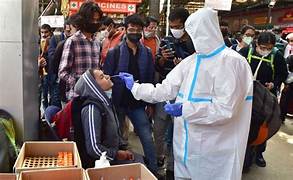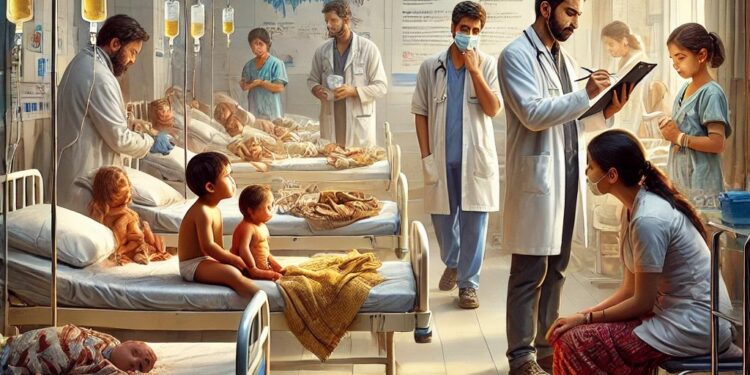In a first for the city, Bengaluru has recorded cases of Human Metapneumovirus (HMPV), a respiratory virus of which the world is wary due to its potential to cause serious complications in vulnerable individuals. Both infants-a 3-month-old girl and an 8-month-old boy-are recently diagnosed cases, underscoring the surveillance of respiratory diseases in India. Interestingly, the families do not have a recent travel history, excluding the possibility of exposure from abroad. All this leads health experts to believe in local transmission while intensifying monitoring in the country.
What is HMPV?
HMPV stands for Human Metapneumovirus, and it is a respiratory virus usually causing mild cold-like symptoms-fever, cough, sore throat, and a runny nose. Most people recover after receiving few interventions. Sometimes, though, it may lead to tightness in the chest or pneumonia, especially in infants, older people, and in those with compromised immune systems. Much like RSV (Respiratory Syncytial Virus), it can induce severe respiratory distress in vulnerable individuals.

The finding of the first cases of HMPV in India had been confirmed through the routine surveillance of various respiratory pathogens by the Indian Council of Medical Research (ICMR). As part of continued efforts to monitor and manage viral illnesses, officials have mentioned HMPV as already circulating in India, but dead-end detection had not been made earlier.
Is HMPV Serious?
Seriousness of HMPV will pertain more to infants, the elderly, and especially a weakened immune system, because of such mild symptoms for most people:
Bronchiolitis: Bronchiolitis is defined as the inflammation occurring in the smaller airways of the lungs.
Pneumonia: Infection by a serious organism which leads the lungs into inflammation.
Exacerbation of a chronic respiratory condition: Asthma or chronic obstructive pulmonary disease most prominently influences this body mechanism.
Infection is generally more severe in young children and the elderly, thus resulting in close tracking by public health authorities.
HMPV Treatments
There is currently no specific antiviral medication available for treatment. Symptom relief is the mainstay of treatment, accompanied by a supportive treatment process. Below are typical recommendations:
Hydration and Rest: It means that a person should drink lots of water and have rest in order to let the body recover.
Pain Relievers: receiving over-the-counter medications such as acetaminophen or ibuprofen would help in the mitigation of fever and body aches.
Humidifiers: A humidifier that is used would ease congestion and coughing.
While in severe cases breathing may be very difficult, hospitalization may be necessitated for pneumonia-related respiratory support.
HMPV and COVID-19 differ in the following major aspects when they are both classified as respiratory illnesses:
1. Cause:
HMPV- HMPV, which stands for Human Metapneumovirus, is a viral infection that results from a virus of the Metapneumovirus family.
COVID-19 – infection caused by SARS-CoV-2 virus.

2. Symptoms:
Both include fever, cough, and breathing difficulties, but the most distinctive symptom of COVID-19 is the loss of taste or smell, which occurs infrequently in HMPV.
3. Modes of Transmission:
Both viruses are spread through droplets produced when an infected person coughs or sneezes. Asymptomatic transmission of COVID-19 is higher in term of both rates and volume.
4. Severity:
COVID-19 has the potential to produce severe complications that can lead to death, particularly in individuals with underlying health conditions. HMPV pneumonia occurs but is usually milder than the former.
HMPV How Long Do You Stay Contagious?
An HMPV patient is contagious for about 3 to 8 days after the onset of their symptoms. During this time, the patient should prevent the transmission of the virus by not having close contact with others, practicing good hand hygiene, and covering their mouth when coughing or sneezing. Most viral transmissible organisms operate through respiratory droplets.
How long will you expect it to take to recover from the HMPV infection?
For cases of the illness that progress slowly, the recovery period after HMPV infection can take from 1 to 2 weeks. Most cases are associated with mild symptoms, with recovery occurring without treatment. Complications such as pneumonia will require lengthy recovery periods, possibly involving medical intervention.
Monitoring and Precautions
Health authorities have stepped up monitoring efforts across the board in regard to HMPV as well as other respiratory viruses, in light of events in Bengaluru. Isolation and treatment comply strictly with protocols at hospitals suspected of having cases. Additionally, the IDSP and ICMR are involved in tracking respiratory illness trends across India.
As a precautionary measure, the Ministry of Health has enhanced its testing capabilities for HMPV as well as other respiratory pathogens. Increased surveillance is necessary following reports of an increase in respiratory illnesses in such neighboring countries as China, where there has also been a surge in cases from respiratory viruses, including HMPV.
Conclusion
HMPV being now confirmed in India, vigilance continues within the health department regarding the ongoing monitoring of this respiratory virus. HMPV shows relatively mild symptoms that spontaneously resolve. Public awareness must, however, be maintained to adopt necessary safeguards to protect oneself and others. Routine health instructions and well-informed decisions can significantly minimize the spread of HMPV and other respiratory tackers within the country.



